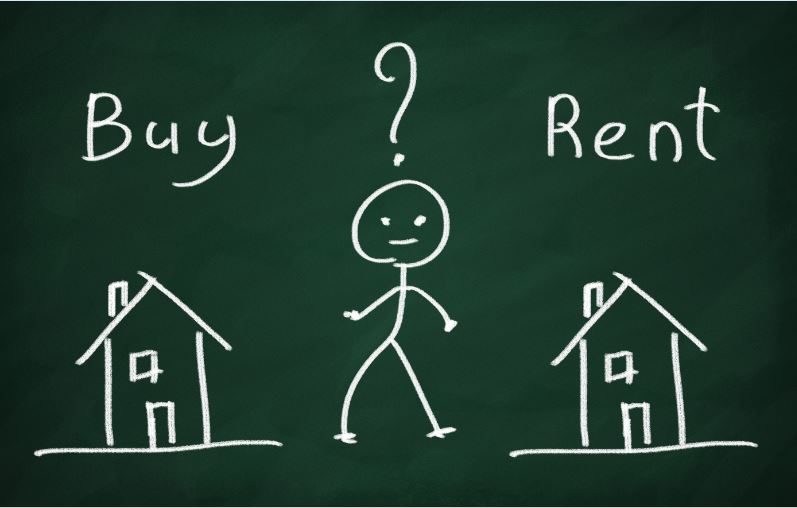
Renters' dilemmas, on the other hand, all boil down to one question: "Can I save money and achieve a better quality of life by owning a home instead of renting?"
To find the answer, we must first understand every relevant factor in the home-buying process. Gathering the facts is the first and foremost important step toward making an informed decision about home ownership, financial responsibility and real security.
The largest considerations in the rent or buy decision-making process are:
- Home affordability
- Down payments
- Mortgage rates and details
- Loans
How To Calculate How Much Home You Can Afford
To understand if you can afford to buy, start by figuring out what you can pay per month. Financial professionals will tell you a home can safely cost between two and four times your annual salary.
This doesn’t consider your existing net worth, but over-investing in first-time home ownership isn’t recommended either. You can always buy more house later, but it’s impossible to undo a mortgage loan.
The idea here is to avoid overextending yourself and living “house poor.” Remember these seven essential factors when deciding how much home you can afford:
- Take-home pay after taxes
- All other debt and monthly payments (credit cards, auto and student loans, etc.)
- Foreseeable expenses you’ll incur in coming years (new computer, car repairs, etc.)
- Cushion funds for potential emergency (job loss, injury, death in family, etc.)
- Future uses for home and space requirements (retirement, children, home office, etc.)
- Down payment funds available (and whether you should buy or wait)
- Expected mortgage cost via a mortgage calculator
What Is My Down Payment?
A down payment is the amount of money you spend upfront when purchasing a home. Taxes and fees aside, the total purchase price of a home is the sum of the down payment and the mortgage. The amount of your down payment influences your mortgage interest rate and will determine how much interest you pay (or save) over the span of your home loan.
A rule of thumb is to buy only if you can afford a 20% down payment. Putting down 20% keeps your interest rate low and saves money on interest paid in the long run. It will also keep monthly payments smaller.
Be aware, however, down payments are expected to vary. Buyer finances differ and some feel comfortable putting more down than others. Figure out what number is comfortable for your budget. Then you’ll have a better idea of whether or not you're close to buying a home.
Six Factors To Remember When Calculating Your Mortgage
Once you’ve figured out what you can spend per month, now ask what amount you can get for that monthly payment. A mortgage is a home loan and the gradual repayment of the principal and interest monthly is called amortization. Monthly mortgage payments are influenced by six primary factors:
- Credit score
- Credit history
- Annual income
- Total debt
- Down payment
- Interest rates
Depending upon your timeline, these variables can be optimized to give you the best mortgage rate.
Most buyers pay off loans and save more for a down payment because lenders give the best rates to those who have low debt and can bring at least 10-20% to the table for a down payment. Many potential buyers wait until their credit improves because lenders will hand out the best rates to those with high credit scores.
Because interest rates are constantly fluctuating, it’s smart to lock in a low interest rate and save money. A lower interest rate means you save on your mortgage by decreasing the cost of the loan and reducing the total cost of interest over time.
What About Qualifying For A Loan?
To qualify for this mortgage amount, lenders require you to have a 28/36 debt-to-income ratio. This means that 28% or less of your total monthly income goes toward housing costs, and 36% or less of your monthly income goes toward monthly debt payments of any kind — your mortgage included.
For this reason, it’s smart to pay down debts before applying for a mortgage. Lenders use this ratio to see what you can afford, but this number doesn’t account for expenses and other costs.
Watch for those unavoidable fees in the home buying process, and look for opportunities to secure a commission refund.
Begin Your Journey Now
Start by calculating your home affordability budget based on income, savings and expenses. Remember that down payments can be between 3.5-20% of the home price, but you’ll need insurance for the lower sums. Make sure your debt/income ratio is solid before applying for a loan. Also, remember that you’ll want a good credit rating and interest rate to lock in the best mortgage rate.)
Forbes Real Estate Council is an invitation-only community for executives in the real estate industry. Do I qualify?
Start your home search today and use the information presented above to be an educated homebuyer.
For more information, contact Prime Lending at the McMullen Group.
Forbes


